
Tony Vevers has created innovative compositions that draw from his favorite subjects: nature, myth, art history, and literature.
Hollis Taggart Galleries is pleased to present “Sailing to Byzantium: The Art of Tony Vevers,” from April 6 through April 29, 2006. For more than 50 years, Tony Vevers has created innovative compositions that draw from his favorite subjects: nature, myth, art history, and literature. The title of this exhibition acknowledges Vevers’s appreciation for poetry, particularly that of William Butler Yeats; as evoked in Yeats’s poem, “Sailing to Byzantium,” Vevers’s work explores life, death, and the timelessness of this cycle.
Hollis Taggart Galleries is pleased to present “Sailing to Byzantium: The Art of Tony Vevers,” from April 6 through April 29, 2006. For more than 50 years, Tony Vevers has created innovative compositions that draw from his favorite subjects: nature, myth, art history, and literature. The title of this exhibition acknowledges Vevers’s appreciation for poetry, particularly that of William Butler Yeats; as evoked in Yeats’s poem, “Sailing to Byzantium,” Vevers’s work explores life, death, and the timelessness of this cycle.
Born in 1926, Vevers has been a central figure of the art world of Provincetown, Massachusetts, for five decades. In addition to his artistic accomplishments, he has worked as a respected professor of art history and has served as an important chronicler of the Provincetown art community, both of the past and of his own generation. His friends included Milton Avery, Mark Rothko, and Robert Motherwell, and while he was very close to Abstract Expressionism, Vevers forged his own innovative creative path. This exhibition will be a coming together to celebrate his art and his life.
The exhibition will include 28 paintings and collages spanning Vevers’s long career. Early works, such as the “winter paintings” Winter Landscape (1955) and Winter Portrait (1957), employ strong, jagged brushstrokes and palettes dominated by greys, blues, and lavenders. In this early period, Vevers deftly explored the possibilities of abstraction and figuration. In the early 1960s, his paintings moved further into a representational style and narrative subjects. Works such as Hound Voice (1961), its title taken from a Yeats poem, have a classical grandeur to them; their monumental figures and simplified forms suggest humanity’s primordial beginnings. And as in the lively, intimate Moon Dog of 1961, these paintings are characterized by simplified forms and rich, vivid colors.
Throughout his career, Vevers has depicted the world around him and his life experiences. Landscapes, such as the stark, angular beach scene, Gull and Ice Floes (1963-69), are rendered modern through bold, reductive compositions. Personal associations, including the family move documented in Transition (1964), are also important subjects. The quotidian, even domestic imagery is created by using employing multiple scenes within a single canvas.
Vevers also incorporates found objects into his work, emphasizing the materiality of the elements in his collages. These pieces include Provincetown/Taos (1992), in which a perfect circle of rope lies on muted abstracted forms that suggest both land and sea. At the same time that Vevers evokes nature, he also alludes to Leonardo’s explorations of ideal proportions. Finally, Vevers’s wit is displayed in his collage Thirteen Ways of Looking at a Blackbird (1982), another mixed media piece employing rope. Drawn from the title of a Wallace Stevens poem, the piece was created for a group show—also based on the poem—of the thirteen artists of Provincetown’s Long Point Gallery cooperative, of which Vevers was a founding member. In these ways, Vevers’s work has skillfully combined poetry and found objects, personal experience and art historical traditions.
The exhibition is accompanied by a fully illustrated catalogue that includes an in-depth essay by Dr. Townsend Ludington, Distinguished Professor Emeritus of American Studies at the University of North Carolina at Chapel Hill. Dr. Ludington is the author of the acclaimed biographies Marsden Hartley: The Biography of an American Artist and John Dos Passos: A Twentieth-Century Odyssey.














